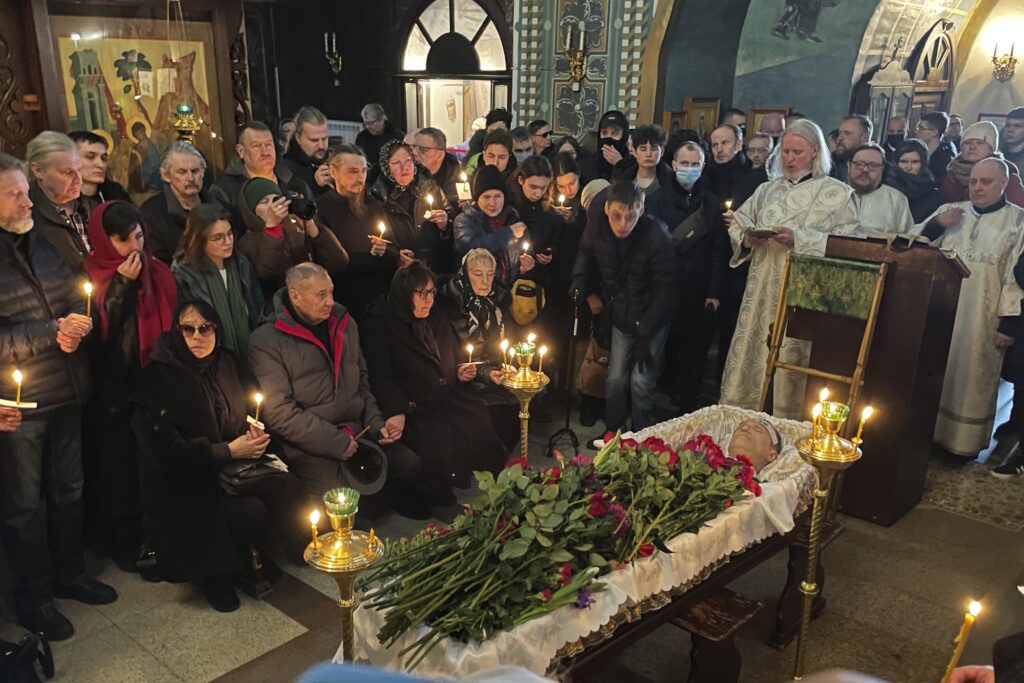Russian opposition leader Alexei Navalny’s funeral drew thousands of mourners, showcasing the late dissident’s stature as a “martyr” against Russian President Vladimir Putin’s rule.
“This is basically what creates, like, martyrdom,” Dr. Konstanin Sonin, an expatriate Russian economist now affiliated with the University of Chicago, told the Washington Examiner. “This will breed this feeling of his future resurrection. And so, I think his name will be growing stronger.”
Navalny’s friends and family played the music from the final scene of Terminator 2 at his burial, an evocation of “the scene [where Arnold Schwarzenegger’s character] sinks into the vat of molten metal and gives a thumbs up,” as the Financial Times Moscow bureau chief noted. The plucky tone belied the dismay felt by mourners who went public with their grief and anger at Putin, whom Navalny’s team has blamed for his death in an Arctic penal colony.
“This is probably our modern Andrei Sakharov,” one unnamed woman told SotaVision, an independent Russian media outlet. “He was not afraid to ascend to Golgotha.”

Sakharov was a Soviet nuclear physicist who received the Nobel Peace Prize “in 1975 for his opposition to the abuse of power and his work for human rights.” And in the Christian scriptures, Golgotha is the name of the hill outside Jerusalem where Roman soldiers crucified Jesus Christ.
“Someone wrote that this man sacrificed himself to save his country,” another woman said on camera. “And the other one [Putin] sacrificed the country to save himself.”
Navalny’s Anti-Corruption Foundation estimated that “tens of thousands of people” turned out to mark his funeral, although Russian authorities reportedly only allowed a few hundred people to attend the “rushed” service.
“He was a very big figure,” said Sonin. “I think he was the most popular politician in Russia. No other politician or any other figure in Russia today would get so much people coming to their funeral.”
Russian officials announced Navalny’s death last month, three years after his arrest upon his return to Russia from Germany. He had been in Germany to receive treatment following an attempted assassination attempt widely believed to have been perpetrated by Russia’s FSB, the successor agency to the KGB, which Putin led before his emergence as outgoing Russian President Boris Yeltsin’s heir apparent.
“In my Protestant parishes, I talked about Alexei all the time. Alexei is — we don’t deserve this man,” one woman said in an on-camera interview with SotaVision. “We will remember him and do something small every day in order to change this miserable government because it’s simply unbearable. … Alexei, forgive us if you can. Eternal memory to you, and thank you for being with us.”
Putin reportedly ordered internal security leaders “not to allow a situation similar to the memorial service for Sakharov,” an unnamed Russian official was quoted as saying by the Moscow Times.
“Navalny’s funeral was a stress test for the Russian authorities,” the official said, per a Meduza translation of the report. “It was one of the most important topics in meetings between Kremlin officials and generals from the FSB [Federal Security Service] and Interior Ministry.”
Russian authorities tried to throttle the internet access in the area, according to activists.
“We’ve confirmed it: [We’ve] recorded another case of mobile [internet] shutdown in Russia — the internet being shut down on the authorities’ orders,” Internet Protection Society head Mikhail Klimarev wrote on social media, according to a Meduza translation, adding that “an outdated type of internet: 3G” was all that was available. “It sort of works (probably), but it has a significantly lower capacity for simultaneous connections. As a result, the network is overloaded and the internet doesn’t function properly.”
Putin’s associates will be able to maintain control as long as the security services are willing to follow their orders.
CLICK HERE TO READ MORE FROM THE WASHINGTON EXAMINER
“Putin and his entourage think about all the previous [dictatorships that have fallen]. … They have [an] extremely simple theory: that there was not enough political will to send police, troops to kill people,” Sonin said. “It works for a long time. And then at some point, it stops working. At some point, there will be crowds. They will make orders, and their police forces would refuse to do what they are ordered. Not yet, but it will [happen] at some point.”
Navalny’s reputation, he estimated, might be the cause of that moment. “Pragmatically, I do not expect that this will result in something, but I think that we will see his name — like when Putin regime collapses, there will be, I could imagine, that the biggest event of the Putin regime’s collapse will be some memorial, some memorial gatherings for Navalny,” Sonin said. “The foundation is laid. And it’s clear that for people who came there, for thousands of people, he’s a martyr for a right cause.”
